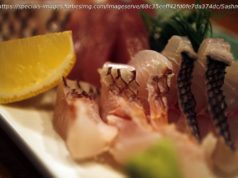The newly elected governor of the Japanese island of Okinawa said Tokyo’s decision to press ahead with the construction of a new U. S. military base on Tuesday is “outrageous” and disrespects local democracy.
TOKYO — The newly elected governor of the Japanese island of Okinawa said Tokyo’s decision to press ahead with the construction of a new U. S. military base on Tuesday is “outrageous” and disrespects local democracy.
Denny Tamaki, the son of an Okinawan woman and a U. S. Marine whom he has never met, won a gubernatorial election last month on a platform of opposition to the construction of a new U. S. Marine base on the island.
He met Japanese Prime Minister Shinzo Abe earlier this month, and told him that Okinawans opposed the building of a base at Henoko, in the northern part of the island. Less than three weeks later, Abe’s government issued an injunction allowing construction to proceed.
“From my point of view, this is outrageous,” Tamaki said in an interview Tuesday while on a trip to Tokyo. “What the central government did today is disrespectful to our democracy.”
The Okinawa prefecture makes up just 0.6 percent of Japan’s total land area, but hosts about half of the 54,000 U. S. troops stationed in the country, including many Marines and the largest U. S. Air Force base in the Asia-Pacific region.
Locals say that’s unfair, complaining about the noise of low-flying aircraft, the danger of accidents and the behavior of a small minority of U. S. service members.
The U. S. military says the island’s strategic location means the bases are vital to the defense of Japan, as well as to keeping the peace in the entire East Asian region, from Taiwan and China to the Korean Peninsula and the Philippines.
Last week, the Okinawan assembly voted to hold a nonbinding referendum on the issue, and Tamaki confirmed that the vote will occur within six months.
“I believe this is a great opportunity for all of Okinawa to show our will,” Tamaki said. Provided the referendum attracted at least 25 percent of registered voters, he vowed to respect its outcome and “carry the result” to Abe and to the U. S. government.
The base in Henoko is supposed to ease the burden on Okinawa, by allowing another Marine Corps base at Futenma, in a much more densely populated part of the island, to close. Nearly half of the 19,000 Marines in Okinawa would be relocated to bases in Australia, Guam and Hawaii.
But many locals say that isn’t good enough: Construction of a base, even in a less densely populated area, cements the U. S. military’s continued presence on their island, they say.
Takeshi Onaga, Tamaki’s predecessor, who died in office in August, had been engaged in a long-running legal and administrative battle with the central government to prevent construction of the Henoko base.
Shortly after his death, the prefecture carried on the fight by revoking a landfill permit for the area, again halting work at the site.
Tamaki said Abe had told him that Tokyo’s stance on the bases had not changed, but Japan’s prime minister also indicated that he would like to reduce the burden on Okinawa. Nevertheless on Tuesday, the central government issued an injunction allowing work on the base to resume almost immediately.
Tamaki expressed his “strong indignation” at that decision, which he described as “completely wrong” and ignoring public opinion in Okinawa.
He said he is not asking for all U. S. military personnel to leave Okinawa, just for the island to take a fairer share of the burden for national defense.
Ethnically different from the people who live on the main islands of Japan, the people of Okinawa have long felt looked down upon. After World War II, the U. S. military continued to rule Okinawa until 1972, two decades after returning the rest of Japan to self-rule.
Tamaki said his father had to leave Okinawa before he was born, and had written to his mother after leaving. But she decided to stay in Okinawa rather than join him in the United States, and burned all the letters and photographs he sent.
Tamaki said his views were shaped from having grown up near a U. S. base, and were not linked to his family background. He likes and respects American culture, he said, especially rock ‘n’ roll, but said the long-running controversy over military bases in Okinawa has undermined the U. S.-Japan alliance.
He said that although the U. S. government regards the location of the bases as a domestic Japanese issue, it should “sincerely talk to the people of the country on what they want, based on the principles of democracy.”
“Depending on whether the U. S. can do that or not, Japan-U. S. security relations will become further strengthened, or transform into something vulnerable,” Tamaki said. “I think we are standing at the crossroads.”
The Washington Post’s Akiko Kashiwagi contributed to this report.






